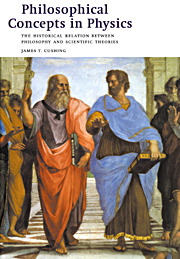 Philosophical Concepts in Physics
Philosophical Concepts in Physics Published online by Cambridge University Press: 05 June 2012
In order to contrast by means of specific examples two different ways of reaching general conclusions about the phenomena of reality, we compare the work of Aristotle with that of Sir Francis Bacon (1561–1626). As we shall see, the difference is one of emphasis and execution rather than of principle. Aristotle favors the discussion of general principles that can be arrived at on the basis of an intuitive grasp of natures, while Bacon stresses the importance of slow and careful induction from specific cases.
ARISTOTLE
Aristotle was born in 384 B.C. at Stagira, a Greek colonial town on the peninsula of Chalcidice in Macedonia on the northern shores of the Aegean. His father Nicomachus (d. c. 374 B.C.) was a physician to Amyntas II of Macedon (d. 370/369 B.C.), grandfather of Alexander the Great (356–323 B.C.). In 367 B.C. Aristotle, at age seventeen, came to Athens and began his studies as a pupil in Plato's Academy. Plato was at that time a man of sixty. Aristotle's life falls rather naturally into three major periods. He spent twenty years at the Academy until Plato's death (348/347 B.C.). The anti-Macedonian mood prevalent in Athens may have been partly responsible for his leaving that city and traveling for the next twelve years. In this second period he went to Macedon in 342 B.C. at the behest of Philip II (382–336 B.C.) to tutor that king's son, Alexander. During his thirteenth through sixteenth years, Alexander was taught by Aristotle.
To save this book to your Kindle, first ensure [email protected] is added to your Approved Personal Document E-mail List under your Personal Document Settings on the Manage Your Content and Devices page of your Amazon account. Then enter the ‘name’ part of your Kindle email address below. Find out more about saving to your Kindle.
Note you can select to save to either the @free.kindle.com or @kindle.com variations. ‘@free.kindle.com’ emails are free but can only be saved to your device when it is connected to wi-fi. ‘@kindle.com’ emails can be delivered even when you are not connected to wi-fi, but note that service fees apply.
Find out more about the Kindle Personal Document Service.
To save content items to your account, please confirm that you agree to abide by our usage policies. If this is the first time you use this feature, you will be asked to authorise Cambridge Core to connect with your account. Find out more about saving content to Dropbox.
To save content items to your account, please confirm that you agree to abide by our usage policies. If this is the first time you use this feature, you will be asked to authorise Cambridge Core to connect with your account. Find out more about saving content to Google Drive.